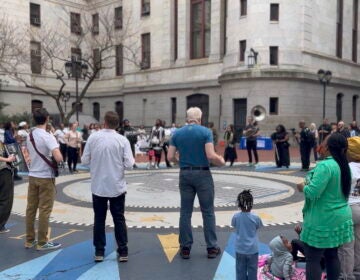New hearings for inmates sentenced to life as children set to begin soon in Philly
Listen
A map at the Defenders Association of Philadelphia illustrating the location and number of inmates sentenced to life in prison for crimes committed while they were juveniles. (Defender Association of Philadelphia)
New sentencing hearings for prison lifers who received their punishment in Philadelphia as teenagers are expected to begin late this summer.
This week, in accordance with the U.S. Supreme Court’s January ruling, state court officials released a plan for taking another look at inmates condemned as children to life behind bars.
The ruling, Montgomery v. Louisiana, offered a chance of release to some 2,000 prisoners around the country. And since Philadelphia has more juvenile lifers than any other place in the country, the decision’s local impact will be significant, affecting more than 300 prisoners who were sentenced in the city.
In 2012, the court found in Miller v. Alabama that mandatory life sentences for juvenile murderers are cruel and unusual. The Montgomery decision this year applied Miller to all prior murder cases involving young defendants.
Justice Elena Kegan wrote for the majority in 2012 that automatic life-without-parole sentences are always unconstitutional for a child because juveniles have “diminished culpability and heightened capacity for change,” and that a life sentence should only be applied to a juvenile if it’s demonstrated that the defendant is “irreparably corrupt.”
That’s what the upcoming hearings will be all about, said Bradley Bridge with the Defender Association of Philadelphia.
“No jury has reviewed that question, no judge has reviewed that question. That’s something that’s going to have to be done now for the first time,” Bridge said.
Each inmate will be scheduled for a hearing in which the Philadelphia district attorney’s office and a public defender will quickly summarize the case; if there are any major disputes between the sides, resentencing hearings will be set no later than four months out.
If prosecutors and defenders are stuck in a dispute about any legal questions, or case facts are a point of tension, the case will be assigned to a panel of judges before new sentencing hearings are scheduled.
The inmates are in prisons all over the state, and it’s going to take some legwork to reassemble their cases. The city is providing support to pay four additional attorneys dedicated to helping the defenders sift through the hundreds of cases.
The district attorney’s office will soon release its own protocol for the juvenile lifer cases.
Bridge said he hopes for the best in negotiations with prosecutors. He said the city is also working on developing a plan to get newly released inmates back on their feet.
“People that have been in 40, 50, 60 years and have been doing fine in prison are appropriate for release as soon as we can establish an appropriate re-entry plan to allow them to get assimilated back into society,” he said.
Victim advocates have criticized the ruling, saying bringing convicts and victims’ families back to court for new hearings will be painful.
Pennsylvania’s Victim Advocate Jennifer Storm said in January that the hearings will open up old wounds for the families of victims.
“There’s a little bit of peace that our crime victims walk away from the criminal justice system with,” Storm said. “And, unfortunately, this takes that peace and it shatters it for all those victims.”
Bridge says the high court ruling doesn’t stop Philadelphia prosecutors from ever again sentencing a teenage murderer to die in prison — it just can’t be automatic, meaning juries and judges will have to weigh the mitigating factors in a defendant’s case.
The U.S. Supreme Court never said they couldn’t get a life sentence,” Bridge said. “They just said it couldn’t be mandatory.”
WHYY is your source for fact-based, in-depth journalism and information. As a nonprofit organization, we rely on financial support from readers like you. Please give today.




